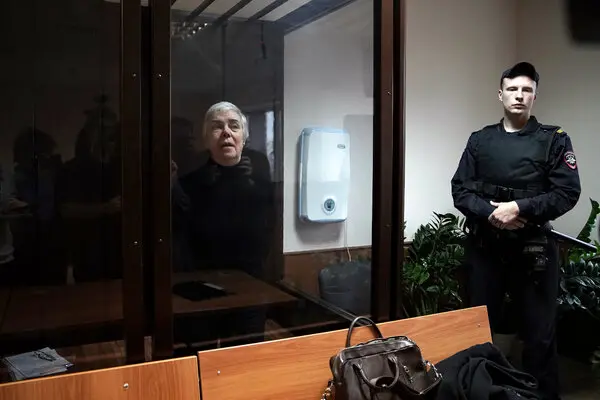A Russian pediatrician, Nadezhda Buyanova, has been sentenced to five years in prison for allegedly making negative comments about the Russian military’s actions in Ukraine. The 68-year-old doctor was led into the courtroom handcuffed and locked inside a glass cage, a common practice for defendants in high-profile cases in Russia. From within the cage, she expressed disbelief over her situation, calling it “absurd” and saying she couldn’t fully comprehend what was happening to her. “Perhaps later I’ll be able to,” she added, struggling to make sense of the events that had led to her arrest and trial.
The case against Buyanova began when the mother of a 7-year-old boy, whom the doctor had been treating, reported her to the authorities. The mother claimed that Buyanova had made critical remarks about her late husband, a Russian soldier killed while fighting in Ukraine. According to the report, the doctor allegedly said that Russian servicemen in Ukraine were “legitimate targets” and criticized the soldier’s role in the conflict. Buyanova denied making these statements, and there was no concrete evidence, such as audio or video recordings, to support the accusation.
Despite the lack of evidence, Buyanova was arrested in February and charged under Russia’s controversial law against spreading “false information” about the Russian armed forces. The law, passed in the wake of Russia’s invasion of Ukraine, has been used to silence dissent and punish anyone perceived as criticizing the government’s military actions. After a period of house arrest, Buyanova was moved to pre-trial detention, and her trial began with her facing the possibility of a lengthy prison sentence.
On the day of the verdict, the courtroom was tense. Before the judge entered, court officials instructed journalists to leave the room. Moments later, a supporter of Buyanova’s in the public gallery cried out, “Five-and-a-half years!”—the length of the sentence handed down to the doctor. The court’s decision was met with shock and dismay by her defense team and supporters. Oskar Cherdzhiyev, Buyanova’s lawyer, called the sentence “monstrously harsh” and expressed disbelief at how “just a few words” could lead to such a severe punishment.
Alina, a member of Buyanova’s support group, explained that the presence of the doctor’s supporters at the trial was meant to show her that she was not alone, regardless of the outcome. “We were all still hoping for a miracle,” she said, visibly upset. “But even if that didn’t happen, at least we could make it a little bit easier for her.” The group’s emotional reaction highlighted the deep shock and sadness they felt at the verdict.
Buyanova’s conviction is part of a broader pattern of repression in Russia, where the government has used laws designed to punish criticism of the military and the government’s actions in Ukraine. The law criminalizing the spread of “false information” about the armed forces was one of several measures introduced after the invasion of Ukraine to stifle opposition and dissent. Under these laws, individuals can face harsh penalties, including prison time, for expressing views deemed contrary to the official narrative about the war.
The case has drawn attention to how Russia’s war in Ukraine is not only shaping its foreign policy but also fueling growing repression within the country. The use of draconian laws to silence criticism is a clear signal of how the Russian government is using the war to justify increasing control over its citizens and suppress any form of dissent.
The sentencing of Nadezhda Buyanova underscores the risks faced by those who speak out against the war in Ukraine. For many, her case represents the harsh reality of a legal system that has increasingly become an instrument of political repression. With dissent being criminalized, Russia’s domestic crackdown on freedom of speech and expression continues to intensify, affecting a wide range of individuals, from medical professionals to ordinary citizens.
As Buyanova begins her prison sentence, her supporters vow to continue advocating for her release, even as they struggle to come to terms with the gravity of the situation. The doctor’s trial and conviction are emblematic of the broader crackdown on free speech that has become one of the defining features of Russia’s current political climate.






